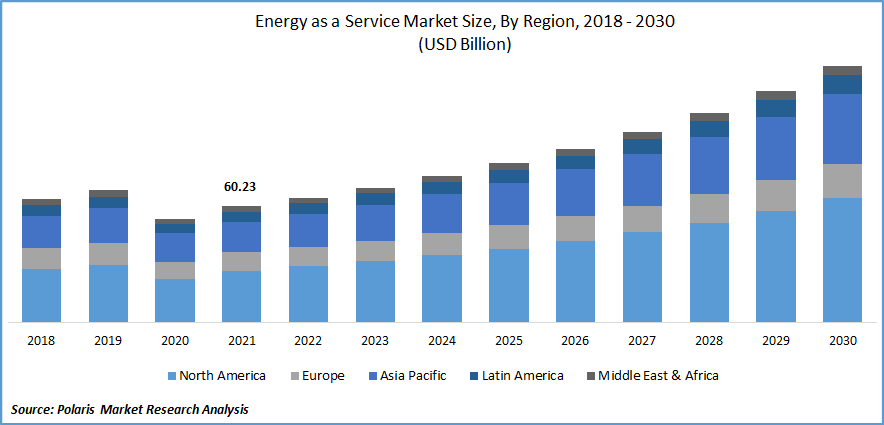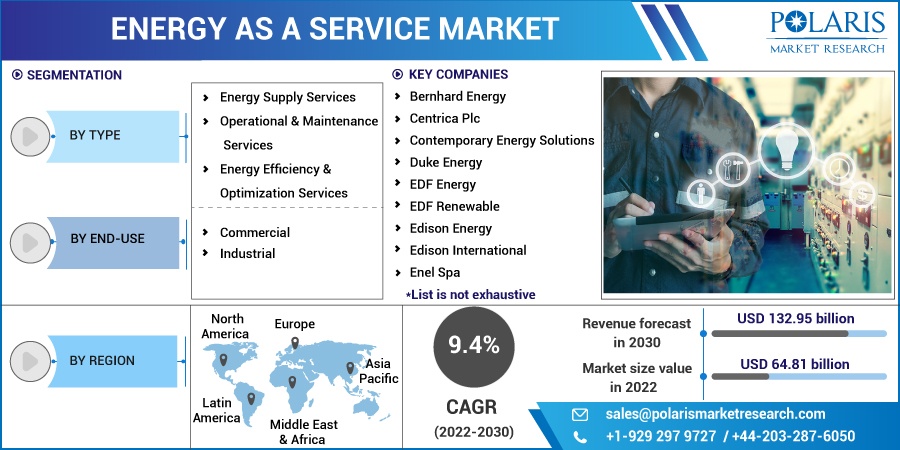
Energy as a Service Market Share, Size, Trends, Industry Analysis Report, By Type (Energy Supply Services, Operational & Maintenance Services); By End-Use (Commercial, Industrial); By Region; Segment Forecast, 2022 - 2030
- Published Date:Nov-2022
- Pages: 117
- Format: PDF
- Report ID: PM2146
- Base Year: 2021
- Historical Data: 2018-2020
Report Outlook
The global energy as a service market was valued at USD 60.23 billion in 2021 and is expected to grow at a CAGR of 9.4% during the forecast period. The growing demand for energy as a service is expected to be driven by rapid industrialization, increasing adoption of renewable energy, and distributed energy resources.

Know more about this report: Request for sample pages
Rapid industrialization has led to the emission of carbon dioxide and increased the level of greenhouse gases in the atmosphere, which has led to the adoption of decarbonization expected to propel market growth. Decarbonization involves the use of renewable energy sources to reduce the intensity of carbon, which has also resulted in the transformation of the transport sector, and the introduction of electric vehicles is expected to drive market growth.
The COVID-19 pandemic had a negative impact on the energy as a service market. Many manufacturing, production, and logistics units were standstill owing to the global lockdown imposed by the government.
In addition, the movement of raw materials required for the manufacturing of electric components resulted in supply chain disruption owing to strict government regulation. Moreover, many industrial and commercial sectors were shut down, which resulted in the downfall of energy demand.
The replacement of traditional energy sources with renewable sources requires a huge amount of investment to install smart grids and equipment, which hampers market growth. Moreover, installing such smart grids requires proper skills and knowledge; the lack of skilled labor is also one of the major factors restraining market growth.
 Know more about this report: Request for sample pages
Know more about this report: Request for sample pages
Industry Dynamics
Growth Drivers
The energy as a service market is likely driven by rising demand for zero-emission energy from various end-use industries. In addition, increasing demand for clean and efficient energy in the residential and commercial sectors and government investment to improve the grid infrastructure are some of the factors complementing the market growth.
Furthermore, the adoption of microgrid technology in various industries due to their ability to produce power with solar and wind energy has also spurred market growth.
The increasing adoption of distributed energy resources (DER) across emerging nations, owing to their energy and cost-efficiency, is also a significant factor in driving market growth.
In addition, DER reduces the emission intensity and cost of power system augmentation and improves reliability which supports revenue growth. Moreover, it has a huge application in rooftop solar, biomass generators, electric vehicles, and microturbines which is expected to drive the market.
Report Segmentation
The market is primarily segmented based type, end-use, and region.
|
By Type |
By End-Use |
By Region |
|
|
|
Know more about this report: Request for sample pages
Energy Supply Services Accounted for the Largest Share in 2021
The energy supply services segment accounted for the highest revenue share in 2021, owing to the rising awareness of energy conservation and government initiatives to emphasize on the usage of renewable energy. In addition, with the rising energy consumption, consumer shift towards a reliable and robust energy source without any grid and inexpensive, which is expected to drive the segment growth.
Moreover, generating an energy portfolio combining different energy sources to meet consumer requirements is also a significant factor supporting segment growth.
Commercial Segment is Expected to Witness Faster Growth
The commercial segment is expected to see a significant surge over the forecast period owing to the increasing energy consumption and rising energy prices in this sector. In addition, the commercial segment includes restaurants, educational institutes, data centers, healthcare, and warehouses, which consume a large amount of energy; the demand for energy optimization and adoption of sustainable energy sources is expected to drive the market growth.
Moreover, energy needs vary according to commercial buildings, and energy as a service (EaaS) implements efficiency programs with better technical skills and minimal resources, which boosts the market growth.
North America is Expected to Dominate and Witness Fastest Growth over the Forecast Period
North America is expected to dominate the energy as a service market owing to the rising commercial and industrial projects in this region. In addition, the growing adoption of renewable energy in these sectors, technological advancement, and government investment in the production and refining sectors are also supporting the market growth.
Moreover, the growing R&D to develop green building models to reduce energy consumption is also expected to drive market growth.
Competitive Insight
Some of the major players operating in the global market include Ameresco, Bernhard Energy, Centrica Plc, Contemporary Energy Solutions, Duke Energy, EDF Energy, EDF Renewable, Edison Energy, Edison International, Enel Spa, Enel X, Enertika, ENGIE, Entegrity, General Electric Company, Honeywell International Inc., Johnson Controls, NORESCO, LLC, Orsted A/S, Schneider Electric, Siemens AG, SmartWatt, Solarus, Southern Company, Veolia, Wendel, and WGL Energy.
Recent Developments
- In June 2022, Ameresco had long-term energy as a service (EaaS) agreement with Northwestern University to address energy-related challenges without upfront capital and advance the institution's sustainability and academic goals.
- In May 2022, GE Digital acquired Opus One solutions and developed a solution named Opus One DERMS to power the energy transition and keep the grid safe, secure, and resilient.
Energy as a Service Market Report Scope
|
Report Attributes |
Details |
|
Market size value in 2022 |
USD 64.81 billion |
|
Revenue forecast in 2030 |
USD 132.95 billion |
|
CAGR |
9.4% from 2022 - 2030 |
|
Base year |
2021 |
|
Historical data |
2018 - 2020 |
|
Forecast period |
2022 - 2030 |
|
Quantitative units |
Revenue in USD billion and CAGR from 2022 to 2030 |
|
Segments Covered |
By Type, By End-Use, By Region |
|
Regional scope |
North America, Europe, Asia Pacific, Latin America, Middle East & Africa |
|
Key Companies |
Bernhard Energy, Centrica Plc, Contemporary Energy Solutions, Duke Energy, EDF Energy, EDF Renewable, Edison Energy, Edison International, Enel Spa, Enel X, Enertika, ENGIE, Entegrity, General Electric Company, Honeywell International Inc., Johnson Controls, NORESCO, LLC, Orsted A/S, Schneider Electric, Siemens AG, SmartWatt, Solarus, Southern Company, Veolia, Wendel, WGL Energy. |
